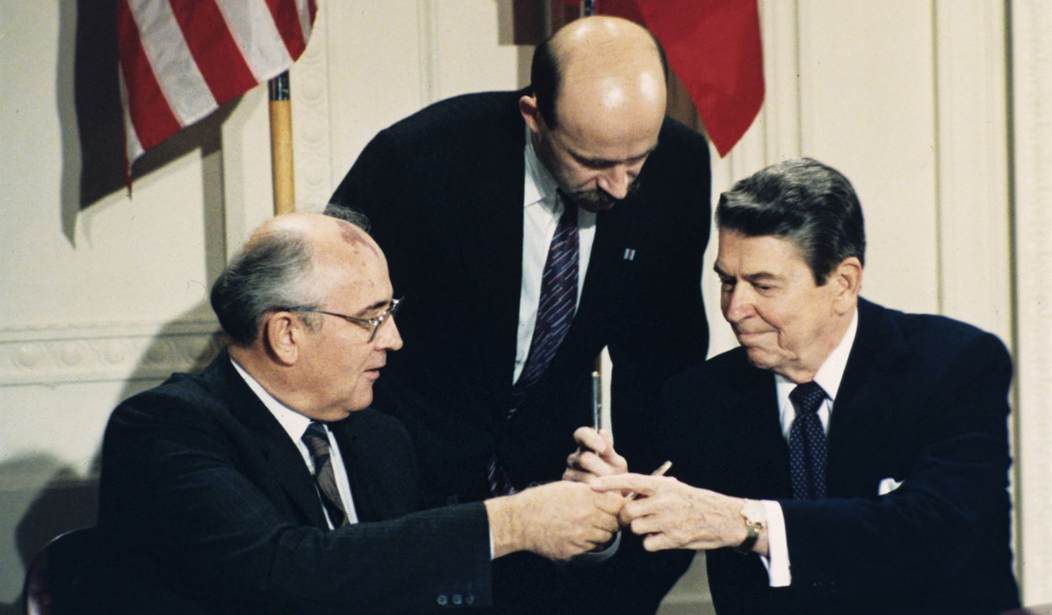If you’d been at the Mark Hellinger Theater in New York on February 18, 1987, you’d have heard the head of Compaq introduce the company’s latest personal computer.
The Compaq Portable III started at $5,000, weighed 18 pounds, had very little memory and computing power, and came with no battery.
Today, many laptops cost only a fraction of that, weigh perhaps a couple of pounds, have far more memory and computing power, and can work unplugged for hours.
In short, although we’re still using computers, a lot has changed in 31 years. And not just when it comes to computers. Take the INF Treaty.
The Intermediate-range Nuclear Forces (INF) Treaty was signed in December 1987 by President Ronald Reagan andSoviet General Secretary Mikhail Gorbachev. It prohibited the U.S. and Soviet Union from possessing, testing and deploying ground-launched cruise and ballistic missiles with a range between 300 and 3,400 miles.
Not just in Europe, mind you, but anywhere in the world. The importance of that point will become clear very shortly here.
Fast-forward to today. Although we’re still in something of an adversarial relationship with Russia, a lot has changed. The Cold War ended. The Berlin Wall came down.
And just as you wouldn’t select aCompaq Portable III for your computing needs today, we shouldn’t rely on the INF Treaty to protect us and our allies.
Of course, that’s not what we hear from some of the treaty’s proponents. Withdrawing from it, as President Trump has suggested doing, “would be dangerous, destabilizing and potentially counterproductive,”John McLaughlin, deputy director of the CIA from 2000 to 2004, wrote recently inThe Washington Post.
Recommended
His mainobjection is that withdraw would only encourage Russia and the U.S. to build more nukes. But that’s already occurring on the Russian side—and has been for a while now.
AsThe New York Timesreported on July 28, 2014: “The United States has concluded that Russia violated a landmark arms control treaty by testing a prohibited ground-launched cruise missile, according to senior American officials, a finding that was conveyed by President Obama to President Vladimir V. Putin of Russia in a letter on Monday.”
This despite Obama’s fabled “reset” with Russia and the New START (Strategic Arms Reduction Treaty) he signed with Moscow in 2010. The administration complained about the missile test, but nothing changed. In fact, by last year the Russians have reportedly deployed at least one operational SSC-8 military unit, foreign policy expert Peter Brookes notes.
This seems to happen with other international agreements. We comply, they don’t. We threaten to leave, everyone predicts gloom and doom. It gets a little old after a while.
The other problem with the INF Treaty is China. It wasn’t a party to the agreement, which isn’t surprising: 31 years ago, it wasn’t the rising military superpower that it is now. But as I’ve been pointing out, things change.
Today, Beijing has the world’s second largest military budget. And it’s been building up its forces for some time now, including in areas that threaten American interests.
“China has developed and deployed a significant conventional and nuclear ballistic and cruise missile arsenal as part of its rising superpower status in the international system and its efforts to assert its interests in the Pacific region — and beyond,” writes Brookes.
Guess who’s been critical of Trump’s announcement that he might abrogate the INF Treaty? Beijing. Think they’d agree to join the agreement? Don’t bet on it — we proposed that in 2007, and the Chinese objected.
So that’s the situation: Russia is violating the treaty, China is building up its missiles, but if we withdraw from the treaty, we’re the “destabilizing” party.
Makes about as much sense as using aCompaq Portable III in 2018. Why trust our security to an outmoded treaty that ties our hands?

























Join the conversation as a VIP Member